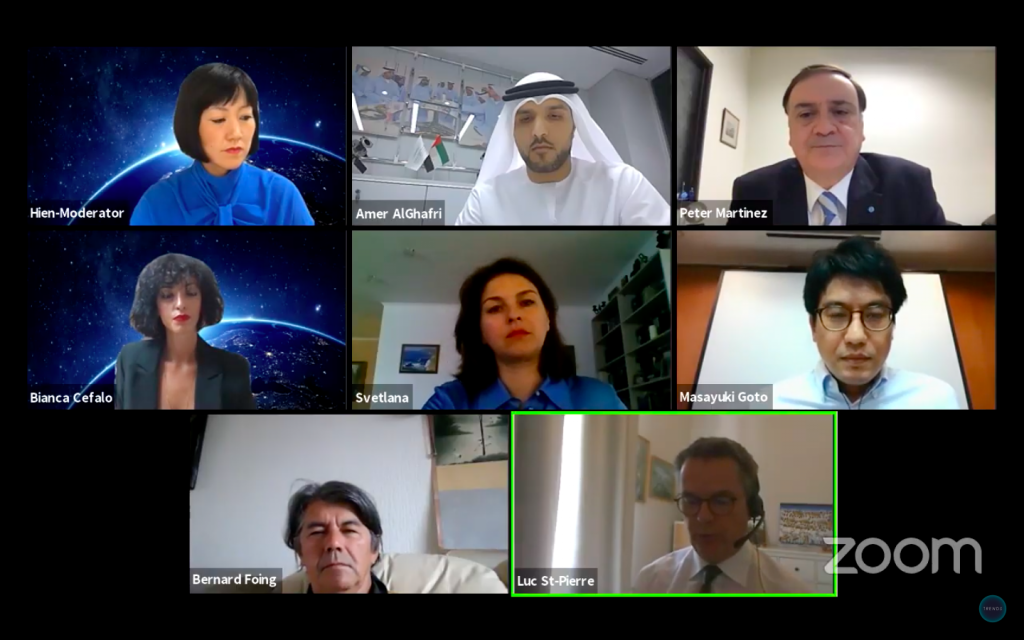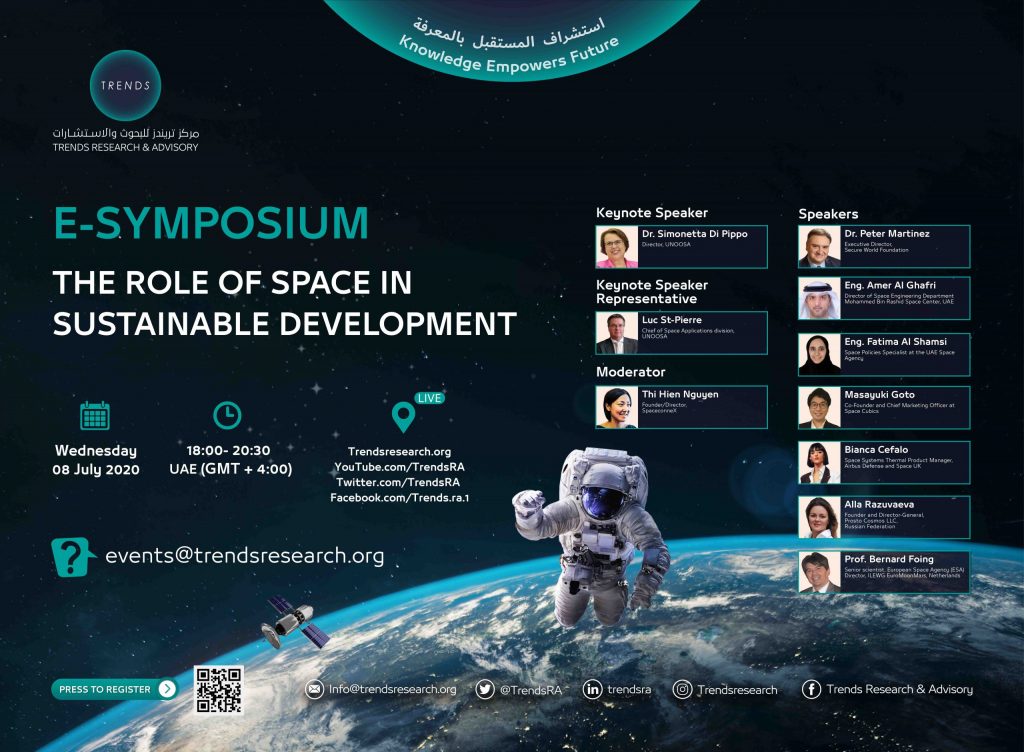



Carla Chahrour
The Role of Space Sector in Technological Advancement, the challenges and opportunities of technological advancements and international cooperation and the future of space explorations, were the main topics of discussion on Wednesday during an E-Symposium on the Role of Space in Sustainable Development organized by TRENDS Research & Advisory.
The symposium highlighted how the space sector of different parts of the world contribute to the Sustainable Development Goals and how such innovative technologies used for space could be used to advance sustainability.
The event brought together a number of prominent experts, space scientists, and researchers from around the world, including Masayuki Goto, the Co-Founder of Space Cubics and Associate Senior Engineer at Japan Aerospace Exploration Agency, Bianca Cefalo, a Product Manager at the Airbus Defense and Space, Fatima Al Shamsi, Space Policies Specialist at the UAE Space Agency, Dr. Eng. Amer Al Ghafri Senior Director of Space Engineering Department at Mohammed Bin Rashid Space Center, Peter Martinez, the Executive Director of Secure World Foundation and Mr. Bernard Foing, Senior Scientist and Advisor to the European Space Agency.
Among the keynote speakers was the Director of the United Nations Office for Outer Space Affairs Dr. Simonetta Di Pippo, who was represented by the UNOOSA Chief of Space Applications division Luc St-Pierre.
The event was moderated by the Founder and Executive Director at SpaceconneX Thi Hien Nguyen, who along with St-Pierre, outlined how the space sector contributes to the Sustainable Development Goals.
Masayuki Goto, the Co-Founder of Space Cubics and Associate Senior Engineer at Japan Aerospace Exploration Agency, gave a presentation that focused on how space development requires essential technologies due it’s ‘unusual environment’ and how such technologies can prove to be very useful in various fields on the ground.
Since humans cannot live in space, Goto said, robots or unmanned satellites controlled from Earth have to be used. For example, robots and remote technologies have come in use during the coronavirus, life-support system, meaning controlling habitable environments, which includes a combination of equipment that allow survival on space such as recyclable water, generating air, can be used in shelters or countries that lack resources, Goto explained.
He also mentioned that microgravity environment can aid drug development and new aloe creation.
“Microgravity environment is used to analyze the crystal structure of proteins to develop new drugs. The structure is figured out and the data is fed back to drug design. Materials that are hard to mix can be mixed under microgravity, so new alloys can be created,” Goto said.
Amer Al Ghafri, the Senior Director of Space Engineering Department at Mohammed Bin Rashid Space Center, gave a presentation that focused on the UAE’s advancements in the space industry.
“The role of the Mohammed Bin Rashid Space Centre along with different entities that were also established in the UAE was to promote space in general, that was done through different programs,” Al Ghafri said.
Al Ghafri then listed the multiple entities developed in the UAE in promotion of the space industry.
One of the programs was the development of satellites in the UAE, the second was the Hope Probe, the third is the astronaut program, which successfully sent the first UAE astronaut and the first Arab to the ISS last year, and the fourth is the Mars 211, an initiative by the UAE that aims on establishing the first collaboration and work in research and development to establish the first city on Mars 100 years from now, he explained.
“This will be a sustainable program where we will have UAE nationals as astronauts or as scientists studying human life in space,” Al Ghafri said
Expanding on the the Emirates Mars Mission called the ‘Hope probe’ he discussed how UAE’s advancements in the space industry reflect their aim on building a knowledge-based economy as it has allowed them to distinctively focus on the cultivation engineers and scientists that will be joining the sector, and in turn contribute to the advancement of science and technology.
“What we’re trying to do with the Mars Mission ‘Hope probe’ is put the first step towards a very strong science and research society in the UAE and the region,” Al Ghafri said.
The Hope Mars Mission, which will be launched on July 15, will go through the Japanese launch vehicle H2A from Tanegashima Space Centre and will reach the planet in February, coinciding with the 50th anniversary of the establishment of the UAE.
“So, A country only 50 years since it’s establishment, can, with high dedication and strong effort, reach Mars and mark it’s step in humanity’s scientific development,” Al Ghafri said.
“The idea was that this probe represents hope for millions of young Arabs looking for a better future here in our region. We hear about all the conflicts and unfortunate events that are happening in this region, but in the UAE, through the space program and specifically through the hope probe, we want to prove that there is a future, there is achievement and there is life,” Al Ghafri added.
The Role of Space in Sustainable Development E-Symposium showcased a series of presentations from around the world that outlined how innovative technologies within the space sector can catalyze new possibilities for solving global challenges and achieving the Sustainable Development Goals.